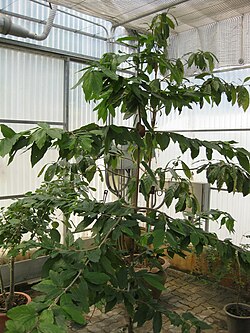Mansonia (plant)
 From Wikipedia - Reading time: 4 min
From Wikipedia - Reading time: 4 min
| Mansonia | |
|---|---|

| |
| Mansonia gagei | |
| Scientific classification | |
| Kingdom: | Plantae |
| Clade: | Tracheophytes |
| Clade: | Angiosperms |
| Clade: | Eudicots |
| Clade: | Rosids |
| Order: | Malvales |
| Family: | Malvaceae |
| Tribe: | Helictereae |
| Genus: | Mansonia J.R.Drumm. |
| Species | |
| |
Mansonia is a genus of flowering plants. It includes five species of large evergreen or deciduous trees. The species are native to tropical Africa and southeastern Asia.[1]
Distribution
[edit]There are three African species. Mansonia altissima ranges across west-central Africa, including parts of Benin, Cameroon, Central African Republic, Republic of the Congo, Ghana, Ivory Coast, Liberia, Nigeria, and Togo. M. nymphaeifolia is native to Cameroon. M. diatomanthera is native to northwestern Tanzania.[1]
The Asian species are M. dipikae, which is native to the Indian states of Assam and Arunachal Pradesh in the eastern Himalayas, and M. gagei which lives in Myanmar, Laos, and Thailand.[1]
The genus is named for Francis Bruce Manson (c. 1850 – 1908), a plant collector in Burma (present-day Myanmar) with the Indian Forest Service.[2]
References
[edit]- ^ a b c "Mansonia J.R.Drumm." Plants of the World Online. Kew Science. Accessed 26 November 2021. [1]
- ^ Burkhardt, Lotte (2018). Verzeichnis eponymischer Pflanzennamen – Erweiterte Edition [Index of Eponymic Plant Names – Extended Edition] (pdf) (in German). Berlin: Botanic Garden and Botanical Museum, Freie Universität Berlin. doi:10.3372/epolist2018. ISBN 978-3-946292-26-5. S2CID 187926901. Retrieved 1 January 2021.
 Media related to Mansonia (Malvaceae) at Wikimedia Commons
Media related to Mansonia (Malvaceae) at Wikimedia Commons Data related to Mansonia (Malvaceae) at Wikispecies
Data related to Mansonia (Malvaceae) at Wikispecies
 KSF
KSF